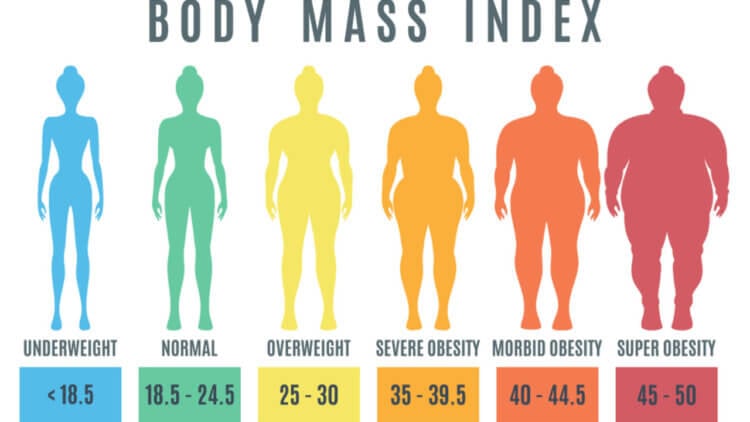A major international study has found that global obesity rates have more than doubled among adults over the past 32 years and quadrupled among children. Many countries have a higher prevalence of obesity than those in which they are considered underweight. To put it simply, the global obesity epidemic continues its staggering growth; today, one in eight people on the planet is overweight, which is more than one billion people. Francesco Branca, director of nutrition for health at the World Health Organization (WHO), said the number of people surpassing one billion had risen “much sooner than we expected.” Although doctors knew that obesity rates were rising rapidly, this symbolic figure was previously expected to be announced no earlier than 2030.

More than a billion people worldwide are obese
Obesity is a serious problem
Obesity entails a number of serious health problems, not only physical, but also psychological. Let's look at why it is considered so harmful.
- Increased risk of developing chronic diseases. Overweight people are more likely to suffer from type 2 diabetes, cardiovascular disease, hypertension, and some types of cancer. Excess fat contributes to inflammatory processes in the body, which is one of the causes of these diseases.
- Load on the musculoskeletal system. Obesity places additional stress on joints and bones, especially the knees and hips. This increases the risk of developing osteoarthritis, a disease characterized by wear and tear of joint cartilage.
- Problems with the respiratory system. Excess weight can cause or worsen problems such as sleep apnea, a condition in which breathing becomes disrupted or stops while you sleep. This can lead to chronic fatigue, high blood pressure and other heart problems.
- Psychological problems. Obesity is often accompanied by psychological problems such as depression, low self-esteem and social isolation. Exposure to bias and stigma can exacerbate these problems.
- Risk of developing metabolic syndrome. It is a complex of conditions including high blood pressure, high blood sugar, excess belly fat and an abnormal cholesterol profile. Metabolic syndrome significantly increases the risk of heart disease.

Obesity is one of the causes of excess mortality in the world
More on the topic: Can obesity be cured with fecal microbiota transplant?

Excess body weight is the cause of a number of diseases
To reduce the health risks associated with obesity, it is important to strive for a healthy weight through a balanced diet and regular exercise. The key aspect is gradual weight loss and maintaining a healthy lifestyle throughout life, rather than quick but impermanent changes.
Read even more interesting articles on our Yandex.Zen channel – articles are regularly published there not on the site!
Why are there so many obese people in the world?
The main conclusion of the extensive study, published in The Lancet three days before World Obesity Day on March 4, is that more than a billion people worldwide are obese. It is a condition associated with numerous complications (including type 2 diabetes, heart disease, high blood pressure and cancer) and, along with excess weight, isthe fifth leading cause of death worldwide.
In 2022, 879 million adults and 159 million children and adolescents were obese, up from 195 million and 31 million, respectively, in 1990, according to a British science publication. In the new study, researchers analyzed the weight and height of more than 220 million people in more than 190 countries to arrive at these estimates.
A total of 880 million adults and 159 million children were obese in 2022.
Related: Does Electrical Vagus Nerve Stimulation Treat Depression and Obesity?
The majority of affected adults are women (504 million, or 57%), but it is among men that the trend has grown fastest in the last 30 years, with prevalence nearly tripling among them, while it has doubled among women. Among children, obesity disproportionately affects boys (94 million, or 59%), and the increase in prevalence is comparable between the sexes – four times for girls and 4.4 times for boys.
Authors from the NCD Risk Factors Collaboration – an international network for research on noncommunicable diseases – assessed trends in obesity and underweight based on more than 3,600 studies covering 197 countries. According to the World Health Organization (WHO), obesity in adults is defined as a body mass index (BMI, weight divided by height squared) greater than 30.

Obesity — this is a long-term problem
Experts acknowledge that BMI is not a perfect indicator because it does not take into account the proportion of fat and its distribution in the body, but note that it is widely used, allowing for comparisons between countries.
As for underweight, it is characterized by a BMI below 18.5. Although underweight is a manifestation of undernutrition, it is not the most commonly used indicator for assessing food insecurity. However, it allows you to illustrate the double burden of malnutrition using the same databases.
Don't miss: Which beer destroys the body and causes obesity, and which is the most harmless?
World problem
“We expected to reach one billion (of obese people) in 2030, but it happened much earlier than we expected,” said Francesco Branca, director of WHO’s department of nutrition and food safety, in Thursday, February 29 during a press conference.
Branca explained that different forms of malnutrition coexist within countries, communities or families, and a child who is initially underweight may later become obese, typically emphasizing «lack of access to healthy food».

Poor diet contributes to obesity
New research highlights the importance of preventing and managing obesity from early childhood through adulthood through diet, physical activity and proper care as needed , said WHO Director General Tedros Adhanom Ghebreyesus.
He added that «getting back on track» Achieving global goals to reduce obesity «requires the cooperation of the private sector, which must be held accountable for the health impacts of its products».
Read also: Sun exposure causes obesity in men
Read also: Sun exposure causes obesity in men
Read also: Sun exposure causes obesity in men
p>
Visceral fat is dangerous to health
Recall that WHO previously supported the introduction taxes on sugary drinks, limiting the sale of unhealthy foods to children and increasing subsidies for healthy foods. Experts say new diabetes treatments may also help fight obesity.